
A Scene from the city of Al-Dhalea (South24)
Last updated on: 14-09-2022 at 5 PM Aden Time

Raad Alrimi (South24)
Al-Dhalea officials said that it pays the heavy cost of strife and its distinctive geographical location between South and North. However, There have been no much changes in Al-Dhalea which is the first governorate that defeated the Houthis and Saleh forces in 2015. It suffers a lot at the levels of services and livelihood.
We hardly passed through short distances in a long time due to the bumpy roads which connect the city of Al-Dhalea with its rural areas. There is an international choppy line in the middle of the city which swings between rural and urban regions. There are no lampposts, platforms or sidewalks here. Access to drinking water is considered a challenge here.
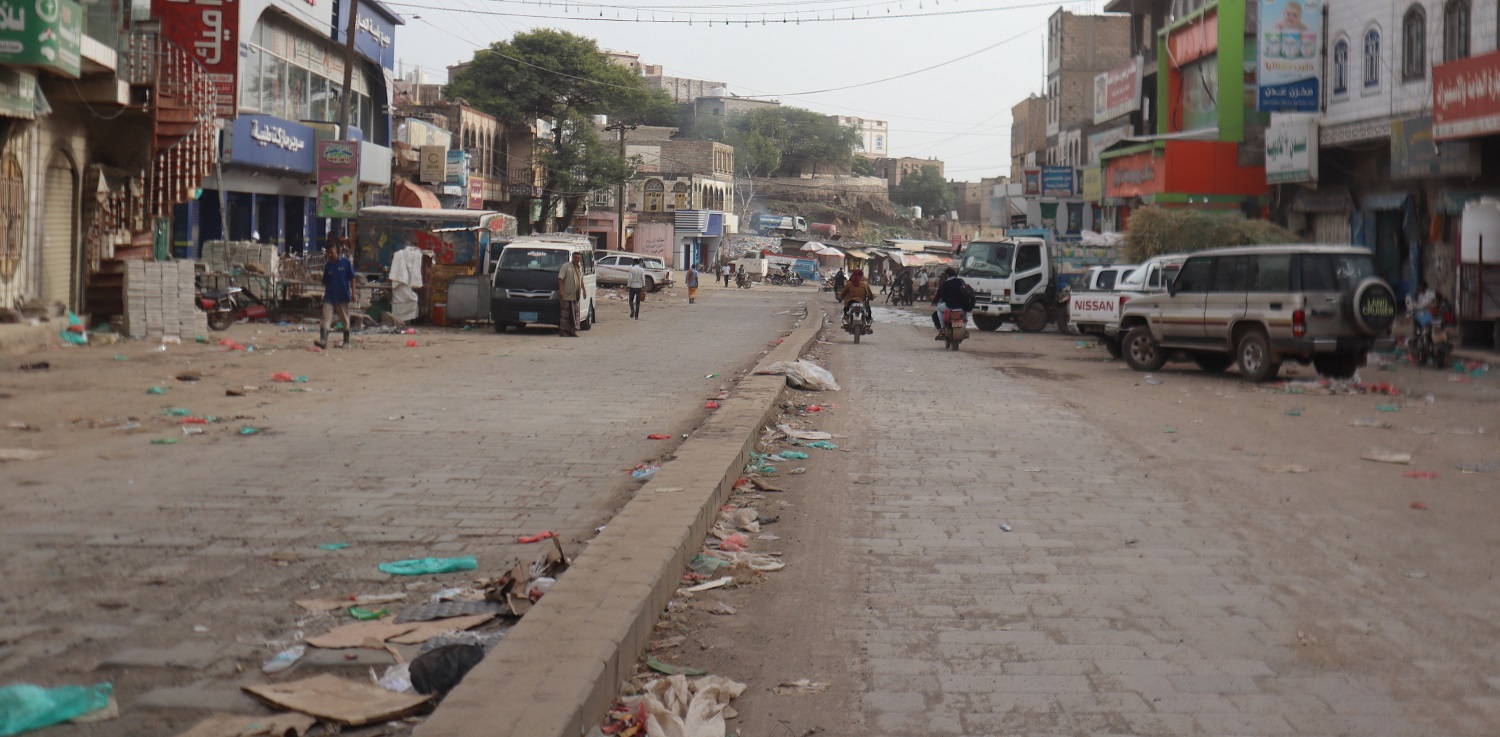
The Main street in the city of Al-Dhalea (South24)
Many patients go to the city capital of Aden as there are no specialized hospitals in Al-Dhalea. Even the only hospital in the governorate which is backed by the World Health Organization is under the threat of closure as it lacks expansion and governmental support.
The power duration in service is only 6 hours per day and even much less than this level in the rural areas. Communication and internet services are the worst as they have not been upgraded or expanded for decades. As for food prices in Al-Dhalea, They reached their own high levels in a country which suffers from a comprehensive economic crisis that made people exhausted.
In this report, issued by “South24” as part of a series of field reports after a tour to the governorate that lasted for some days, we monitor the real services and the actual conditions of people in Al-Dhalea which is a prominent stronghold for STC and the Previous Southern Movement (Hirak).
Water
In the city of Al-Dhalea, one can see many water tanks on top of the houses’ roofs. People pay high costs to fill these tanks from portable tanks on board of vehicle.
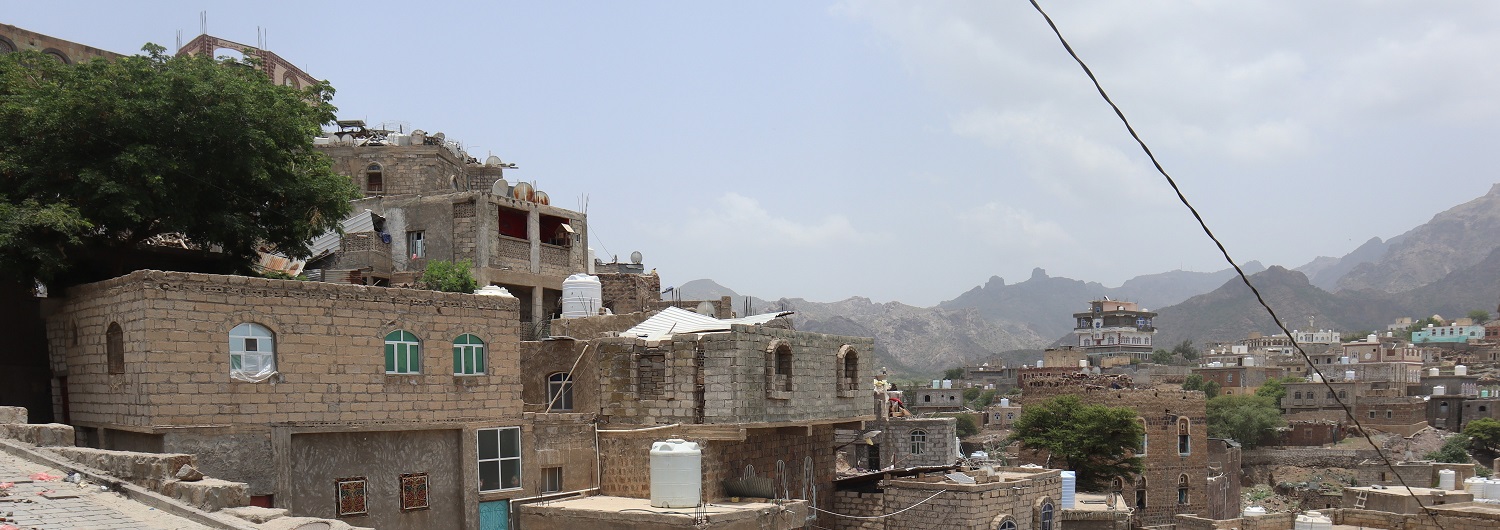
Water tanks on top of the houses’ roofs in the city of Al-Dhalea (South24)
In the field tour made by “South24” reporter, people said: “Some organizations completed digging a number of wells and then they handed them over to local parties which refused to deliver them to the General Establishment for Water to benefit everyone”.
People complained that a military brigade in Al-Dhalea seized a well which used to provide the city with water although it was dug on a swath of land donated by its owner for the sake of the people.
Commenting on the severe water crisis there, citizen Nabil Al-Shoeibi told “South24” that “Al-Dahlea’s rural areas rely upon underground wells as a basic source of water. However, many of these regions suffer from a scarcity of underground water”.
He added: “in the city of Al-Dhalea, there are no wells or water networks extended to the houses. Many locals resort to buying water from the portable tanks with a cost that exceeded 45,000 Yemeni riyals”.
Governor of Al-Dhalea, Major General Ali Moqbel, attributed the suffering of people in the governorate from water crisis and other services to a number of reasons including what he called “the deprivation”.
Moqbel told “South24” that “Al-Dhalea suffered compelling circumstances including annexing new districts to the governorate and depriving it from services and projects by the former regime over the past period”.
He added: “Moreover, Al-Dhalea’s geographical location on the borders with North Yemen makes it a permanent war zone in different stages”
As for the water crisis, the governorate said: “Such a problem can’t be solved overnight. The problem began with the lack of real strategic vision by consecutive authorities for the problems of water and other services”.
He added: “The water basin in Hajr District which feeds Al-Dhalea faces the risk of depletion. The limited water in the basin is not sufficient to meet people’s needs". Governor Moqbel admitted that the 35th Armored Brigade seized a well. He added that “there are unremitting talks to solve the problem”
Moqbel conveyed good news to Al-Dhalea’s people about receiving formal promises from Kuwait to dig five additional wells soon.
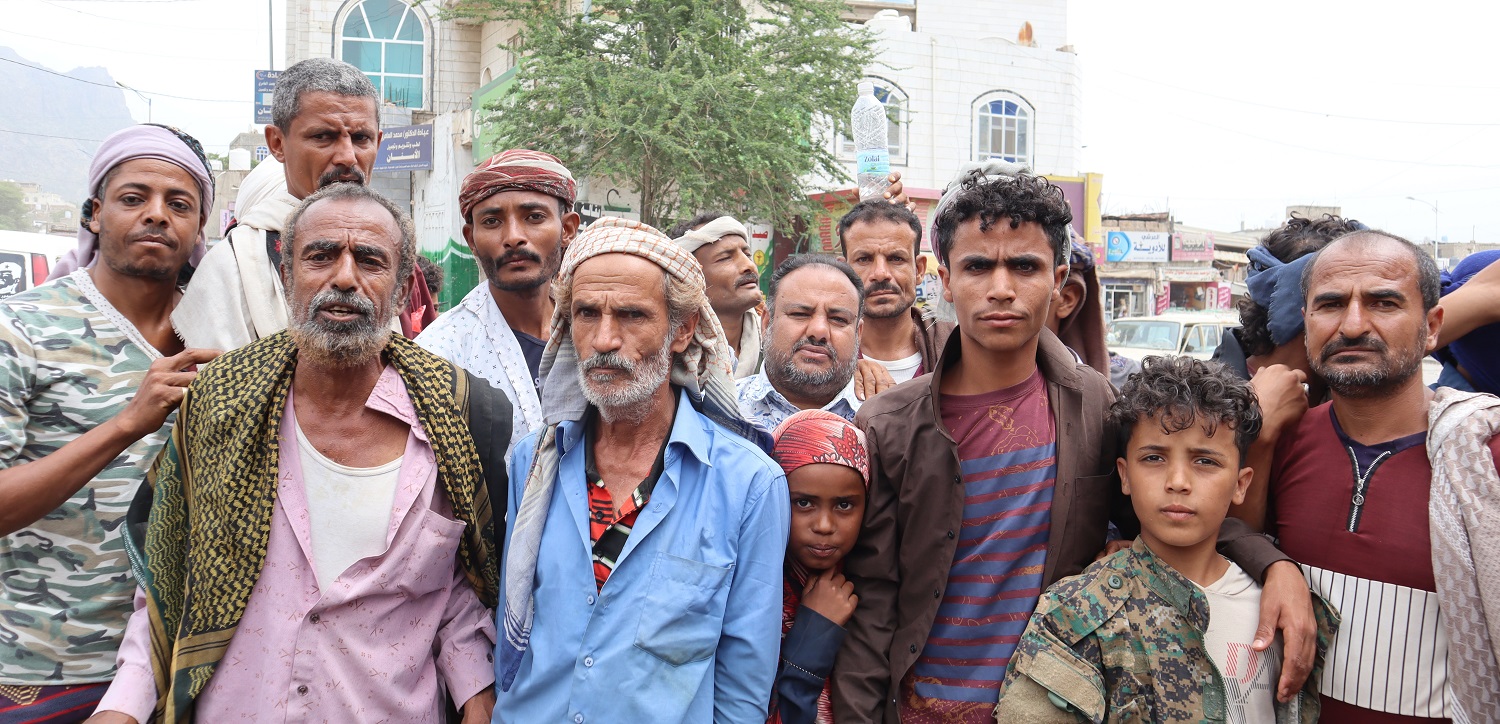
Locals from Al-Dhalea speaking with South24’s reporter about their problems
Regarding the role played by Al-Dhalea’s authorities towards the water crisis, First Deputy Nabil Al-Afif told “South24”: “We achieved the aid water project in the governorate by receiving support from some organizations three years ago. This has alleviated the crisis to a large extent”.
He added: “Al-Dhalea needs not less than 10 wells to reach the state of water sufficiency. Furthermore, there are many wells which need maintenance and to be deepened”.
The local official promised Al-Dhalea’s residents to allocate 50% of the upcoming water projects for the city and the remaining for the rural areas”.
Al-Afif accused the international organizations in the governorate of negligence. He noted that “these organizations failed to solve many problems although they promised to do”.
Health
Health services in Al-Dhalea are one of the worst among the Southern governorates according to locals who spoke to “South 24”, doctors and nurses. There is a lack of many important vaccines and drugs in public and private hospitals, where patients receive poor care.
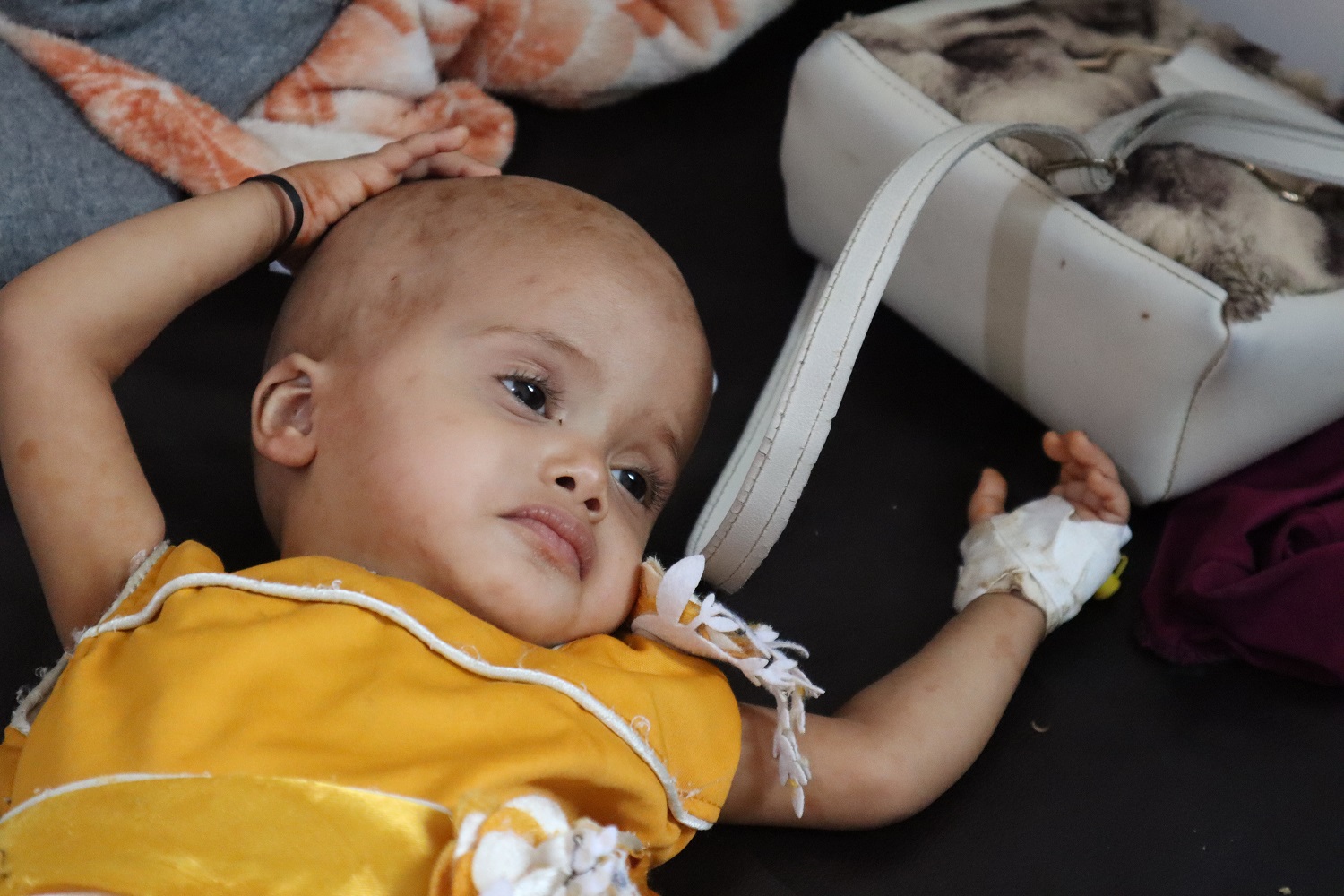
A child suffers from malnutrition, Al-Nasr Hospital in Al-Dhalea (South24)
During a tour by the “South24” reporter in the Al-Nasr hospital, the biggest public hospital in Al-Dhalea, there was a remarkable shortage in capabilities in the technical aspect, infrastructure as well as the medical cadres.
The hospital's Director Dr. Muhammad Mohsen Al-Haidari told “South24” that “ the support received by the hospital is only limited to international organizations and the government’s little aid” He added: “The hospital’s budget, set by the government, is only 10 million riyals per month, and it has not changed for years and this is too little.”
Al-Haidari blamed the Health Ministry and the local authorities in the governorate for the deterioration of the hospital’s conditions. He added that “it needs about 50 million riyals per month to provide services appropriately”.
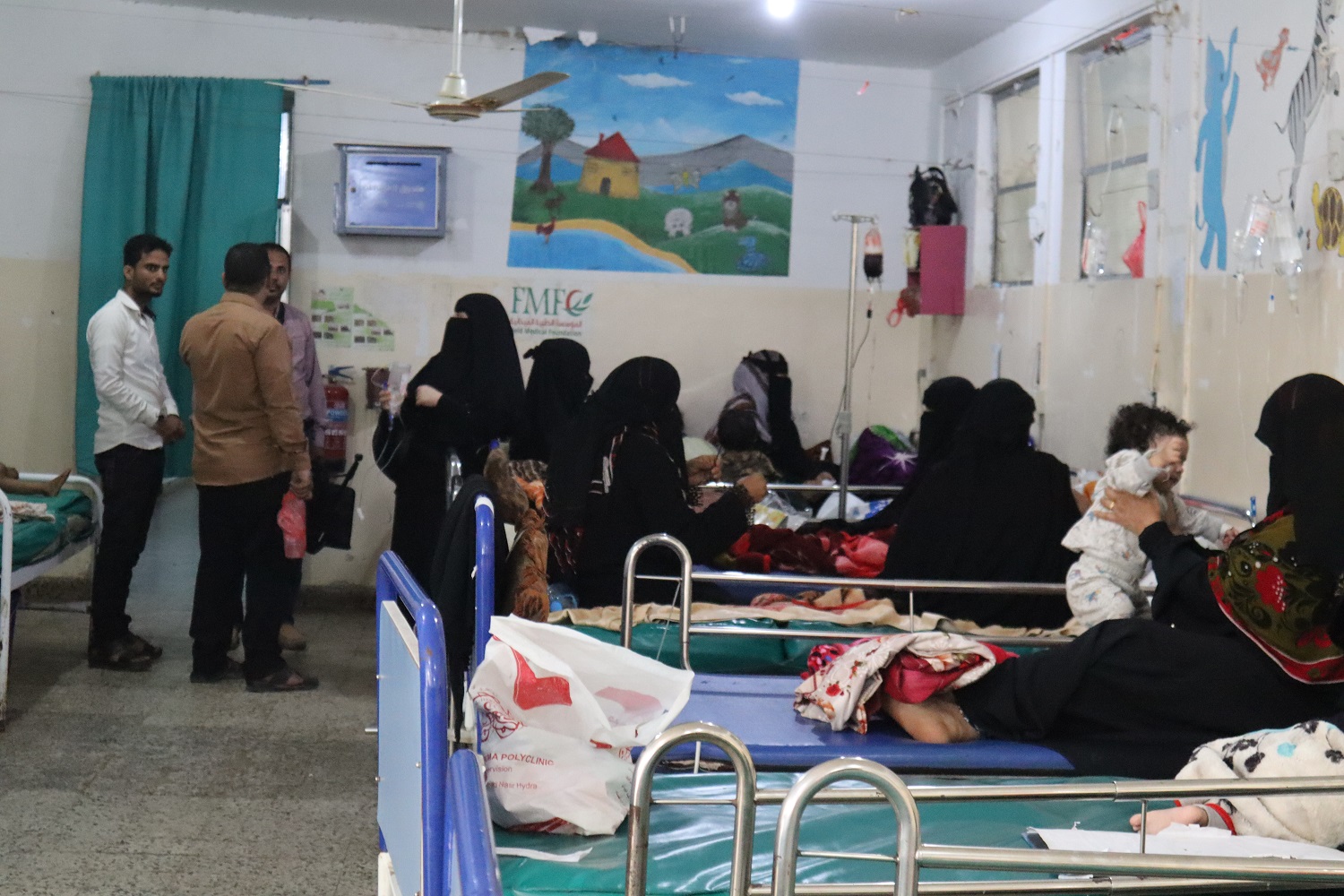
Children Department, Al-Nasr Hospital in Al-Dhalea (South24)
He added: “The Hospital lacks medicines, intravenous fluids, rabies vaccine, and anti-malnutrition equipment. Every week, a number of children in Al-Dhalea die as a result of malnutrition and the lack of rabies vaccine”.
The medical official warned that the “Nasr Hospital can be closed if it ceases to receive support from the World Health Organization which is represented in Oxygen and water. This is in light of the Health Ministry’s refusal to increase the budget or to supply the hospital with the operational requirements”.
He noted that “most cases which are transferred from Al-Nasr Hospital to the capital city of Aden are Neurosurgery ones”.
Diarrhea, fever, heart diseases, children, malnutrition-burning, fracture are basically the top cases received daily by Al-Nasr hospital from different areas of Al-Dhalea, especially the city of Al-Dhalea, Qataba and Al-Azariq districts.
"Doctors Without Borders"’s withdrawal from Al-Dhalea in November 2018 was an additional problem which weakened the already debilitated medical sector. This is due to the important medical services delivered by the organization over years. In a statement, the organization said that it closed its humanitarian project in Al-Dhalea in the wake of violent attacks which targeted it.
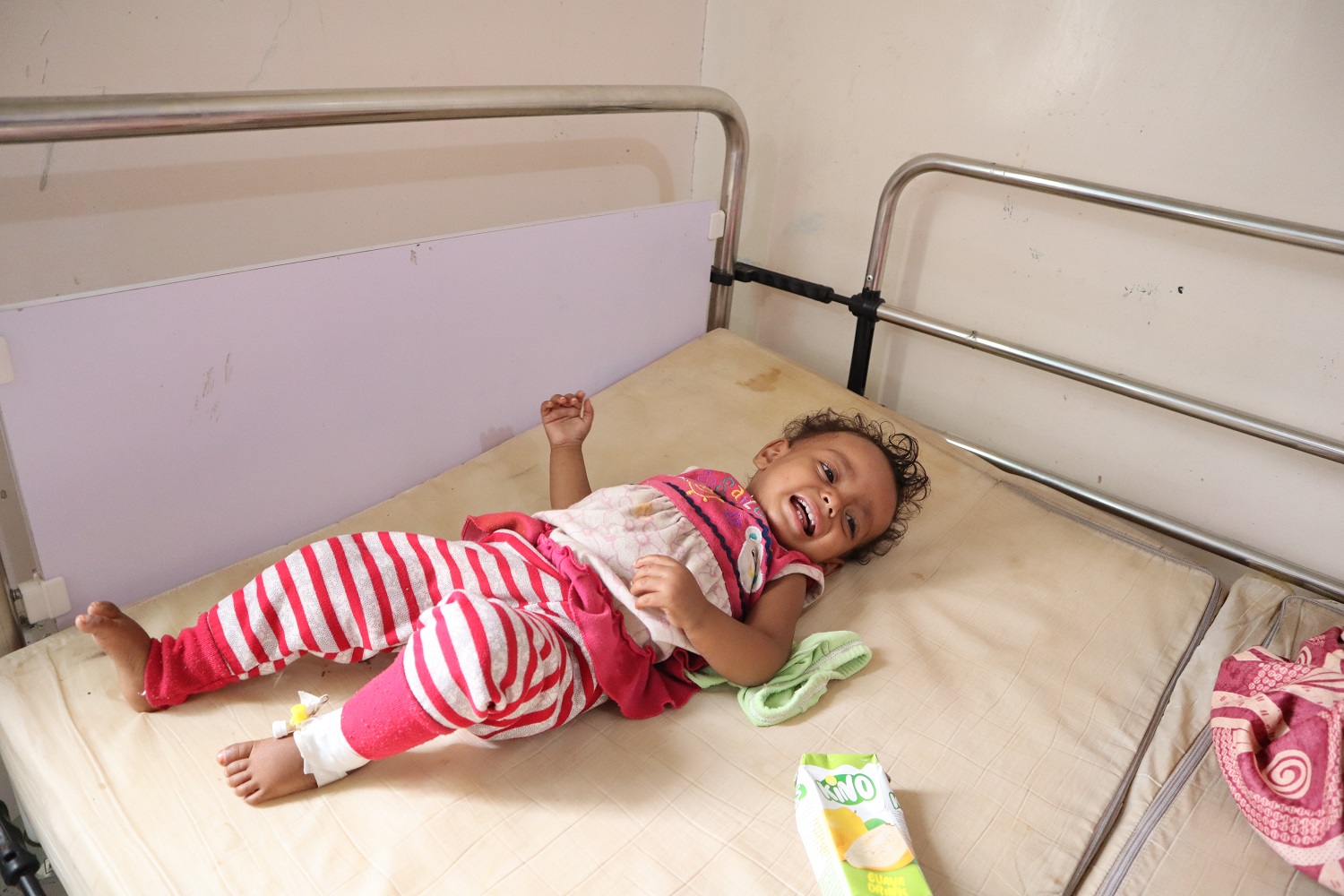
A child suffers from malnutrition, Al-Nasr Hospital in Al-Dhalea (South24)
Al-Afif criticized the organization’s withdrawal as “its activities are supposed to be basically in the troubled areas”. He added: “the organization preferred to leave Al-Nasr hospital and to work in a remote area although the hospital needs it”.
“Al-Nasr hospital was built decades ago funded by the State of Kuwait, and it has not so far witnessed any upgrade, development or expansion” according to Brigadier General Ali Al-Oud, Head of the Administrative Authority of Al-Dhalea’s Municipal Council. He told “South24” that “Hakwala Hospital which was built in 1995 has not been yet in service”.
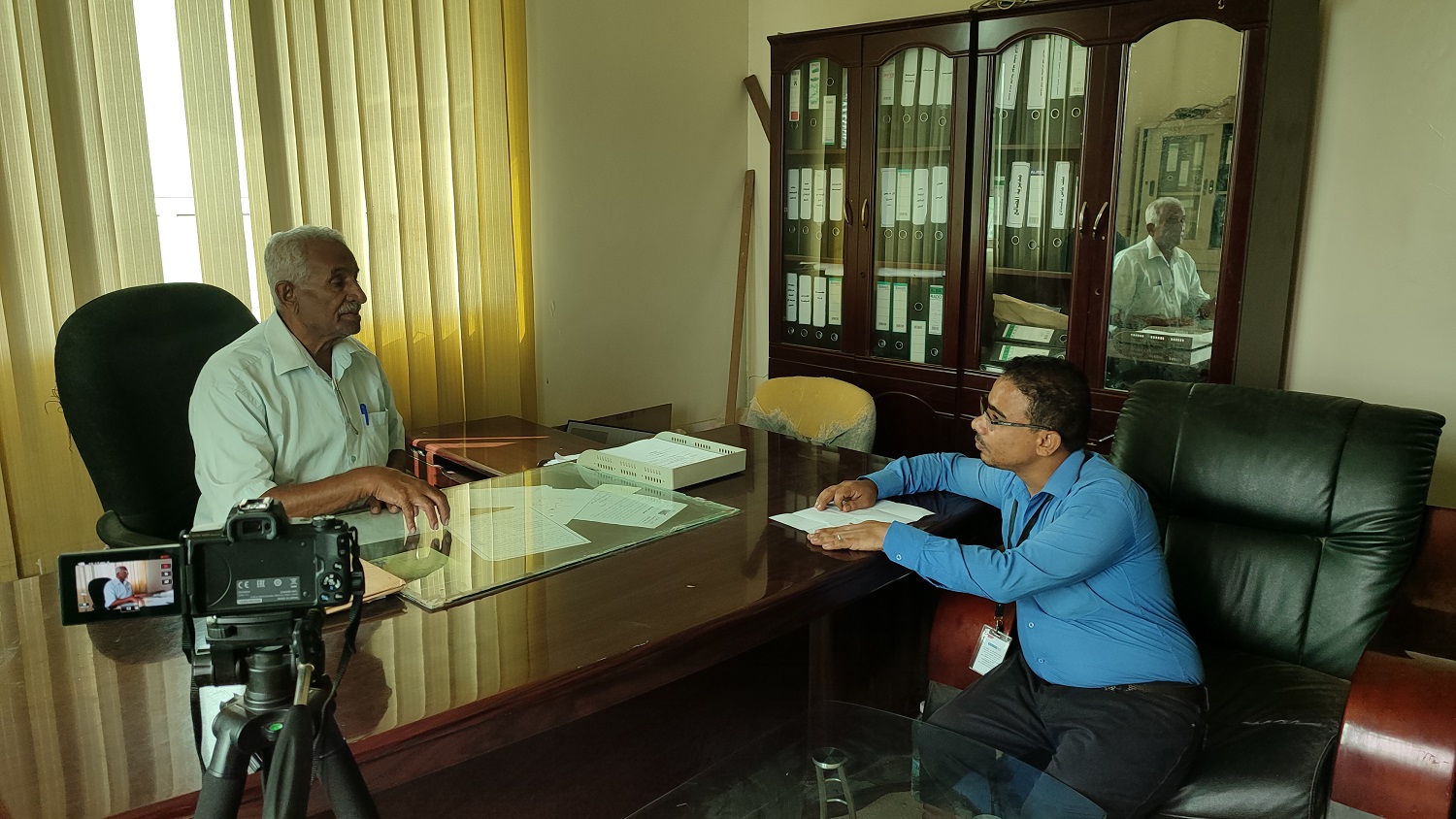
South24’s reporter with Brigadier General Ali Al-Oud, Head of the Administrative Authority of Al-Dhalea’s Municipal Council
Al-Dhalea’s Governor accuses the “successive governments” of “not giving the governorate the right to expand in the medical services” Moqbel added: “The Central Hospital of Al-Dhalea has been built for more than 20 years. This is unprecedented in the world. The government has been apparently unwilling to accomplish this project”.
He added: “These problems were conveyed to all higher authorities including the Cabinet, the Health Ministry and the international organizations but there is a form of indifference towards the governorate which has incurred the costs of treating hundreds of injured people on a daily basis”.
He added: “We have made hard endeavors to increase the budget of the hospital and pressure the Health Minister. We also seek the return of ‘Doctors without Borders’ to Al-Dhalea. There are ongoing efforts with the Health Ministry to pay the pending financial entitlements to a contractor for resuming building Hakwala Hospital”.
Roads
From cracks and holes to the lack of lampposts as well as the the accumulation of random stalls and waste, the conditions of the public main road in the city of Al-Dhaea reflect the infrastructure status in the governorate which has not witnessed many road projects and whose many rural areas still lack paved roads”.
In the field tour, locals complained to “South24” about their sufferings from the worsening conditions of the main and the sub roads in Al-Dhalea, and the impact of this on their vehicles and the old people who experience many hardships when passing on these roads”.
Mohammed Fadl, who is in his fifth decade, told “South24”: “There is only one public street in Al-Dhalea. However, it is deteriorating and very bad. People here live in very dire conditions. They suffer from poor public services in nearly all fields including roads”.
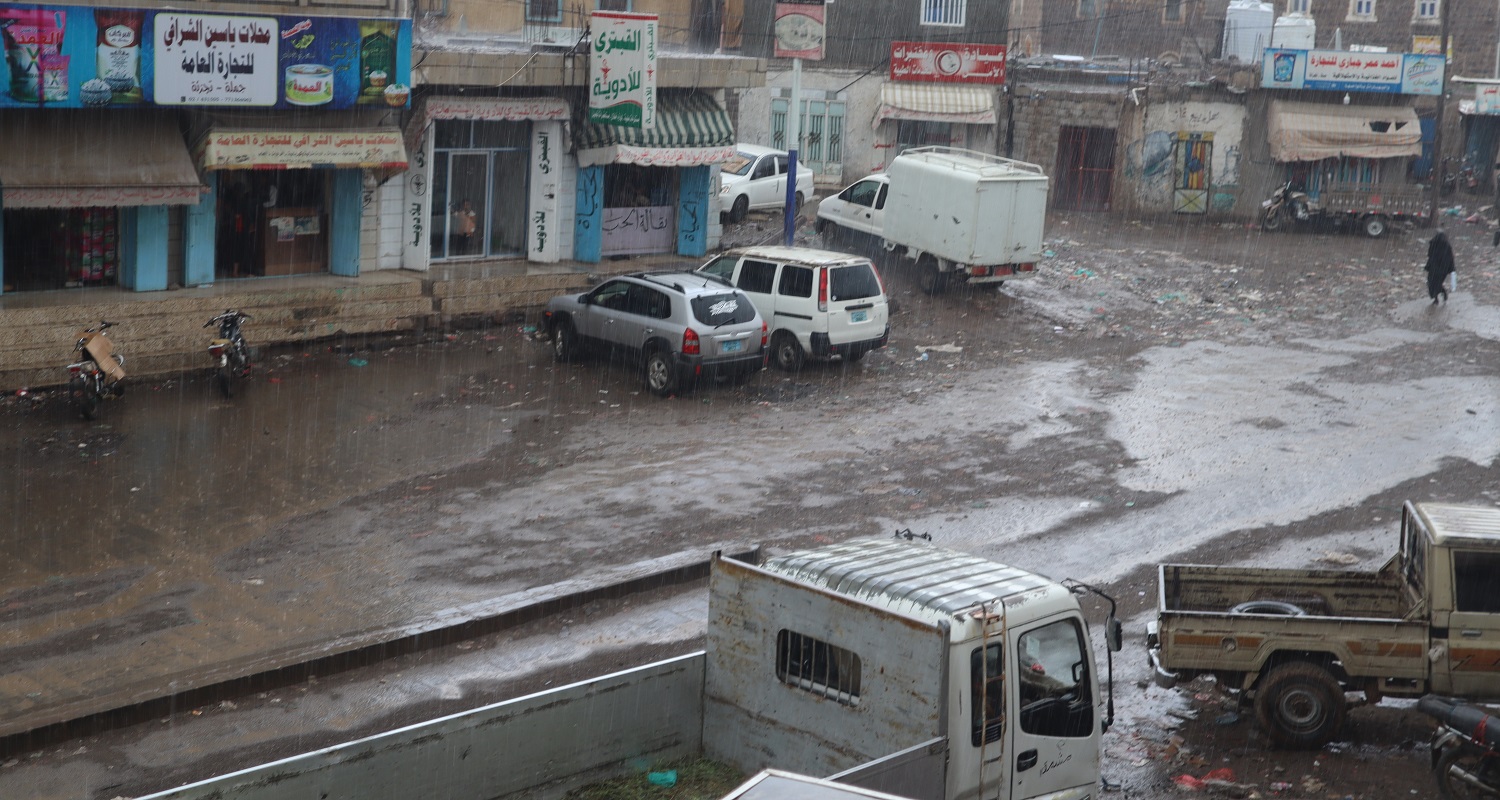
A street in Al-Dhalea after heavy rains (South24)
Nabil Al-Afif holds the central authorities responsible for the deterioration of the infrastructure and roads in the governorate” He added: “Although Al-Dhalea is the first governorate that was liberated from the Houthi hands, it has not been fairly treated”.
He continued: “A comprehensive file containing the governorate’s needs was sent to the Cabinet, international organizations and the Arab Coalition but there has been no response till now ”.
Al-Afif said that “most activities made by the international organizations, though their scarcity are not conforming to specifications, especially in the road field”. He added”: “Paving projects backed by the Saudi program stopped after they reached Al-Dhalea’s outskirts”.
He added: “The road maintenance activities lacked the required standard quality. There were flaws in the implementation process like what happened to the Naqeel Al-Rabd Road Asphalting Project''.
For his part, Ali Al-Oud attributed the flaws of the road projects to its implementation by “The Ministry of Health and the international organizations in the governorate without the participation of the local authorities in the implementation and oversight process”.
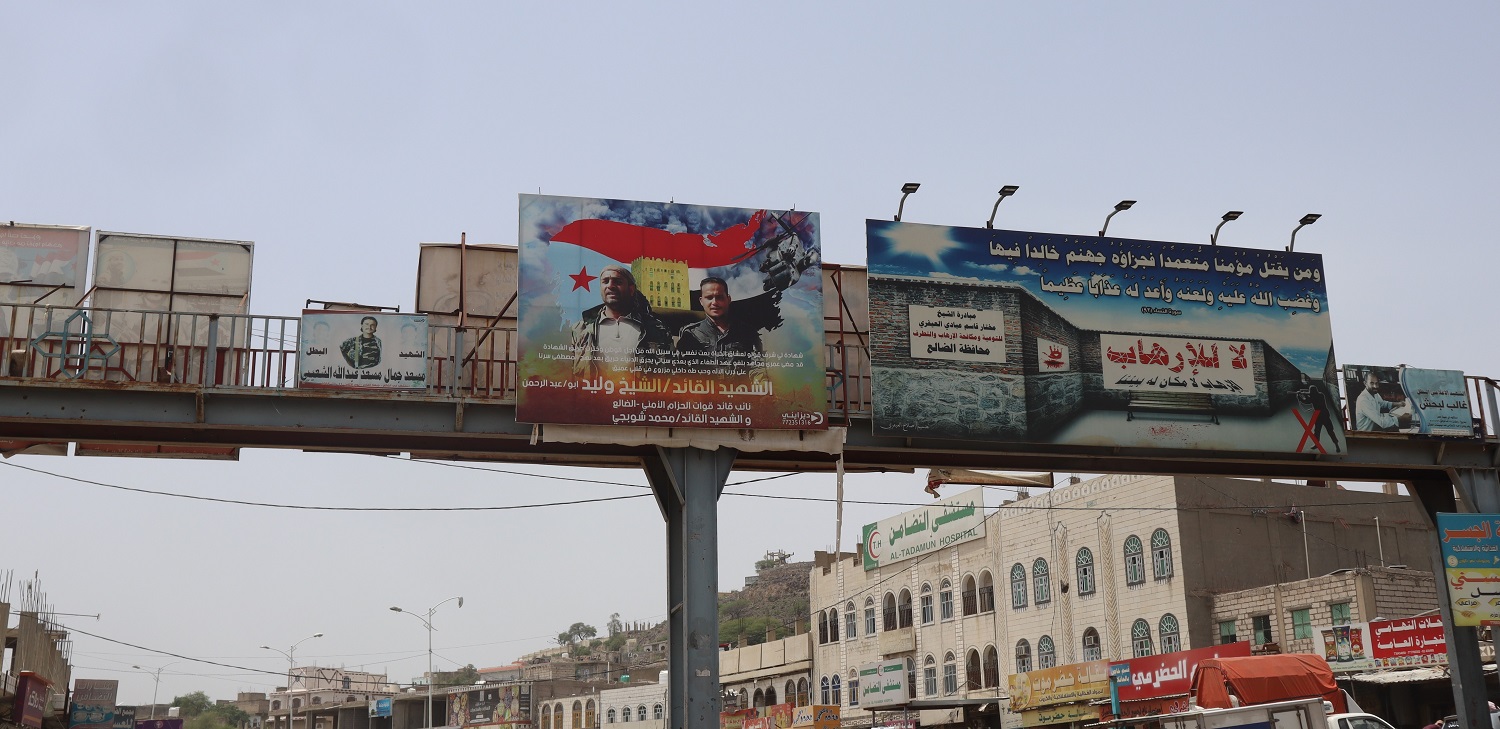
Banners in the main street of Al-Dhalea carrying the names and pictures of the late Southern commanders and soldiers (South24)
He added: “There has been no road restoration project for one year. The last one was for Al-Amd Road to Qataba District (west of Al-Dhalea). Al-Oud claimed that asphalting the road witnessed manipulation in the implementation process and that defects emerged after less than two months”.
Electricity and communication
Power outages in Al-Dhalea reach 18 hours per day, and exceed this in some rural areas. This has been the case for many years since the outbreak of the violent 2015 war by which the governorate is the most affected.
Despite the few in service- power durations, areas in the governorate especially in the rural areas suffer weeks of power outages due to heavy rains and floods. Locals complained to “South24” about the slow response by maintenance teams towards malfunctions and damages.
“When a wire or a cable is cut or in case of any malfunction, we summon engineers in return for fees incurred by us in addition to any material costs,” a local source said.
Visitors of Al-Dhalea face hardships to find a hotel which has ongoing power service. The owners of the hotels justify this by the growing cost of fuel used in the small generators. At night, the streets of the cities are covered with murky darkness, even in the roads which have no lampposts.
Commenting on that, Ali Al-Oud said: “the operation budget of the Electricity Office in Al-Dhalea is zero amid the absence of any central governmental role”.
Moreover, Al-Dhalea suffers from poor communication and internet services at all levels. So far, many rural areas of the governorates are completely isolated from the world as they lack internet services while there are limited mobile services".
Food prices
The problems of Al-Dhalea people are not limited to poor water, electricity, roads, communications and medical services. The food prices in the governorate's markets are amongst the highest in South.
Nabil Al-Afif admits the hike of the prices of basic food products in Al-Dhalea by big percentages that sometimes reach 20% regarding some commodities in comparison with other governorates like Aden. This is in addition to the price differences among the districts in an indicator about the lack of oversight.
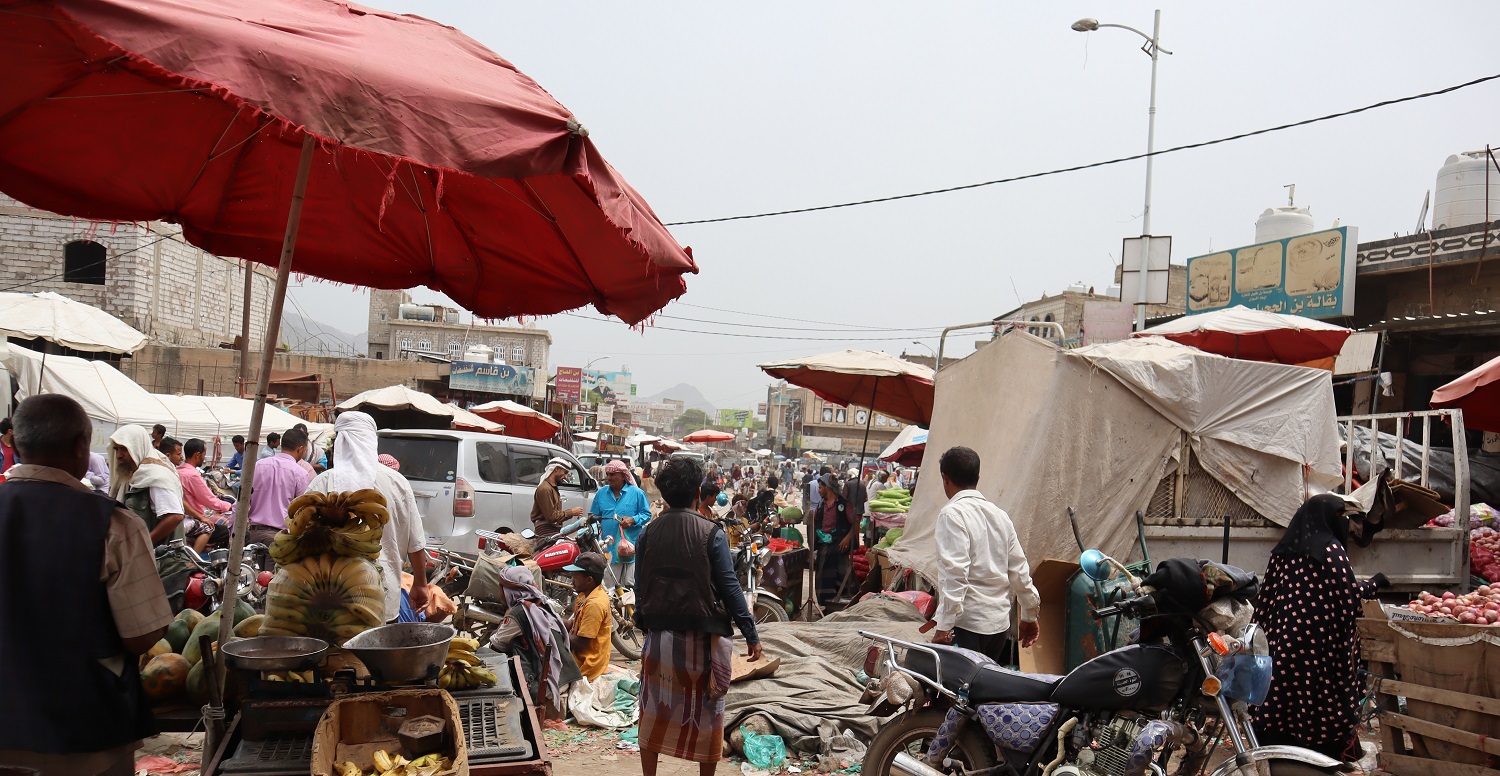
A market in the city of Al-Dhalea (South24)
Al-Afif said: “Al-Dhalea suffers from the growing prices in a mad way. People suffer a lot. There are several reasons for that, foremost of which are the lack of traders in the governorate and their monopoly practices. The prices are the highest in comparison with the other governorates”.
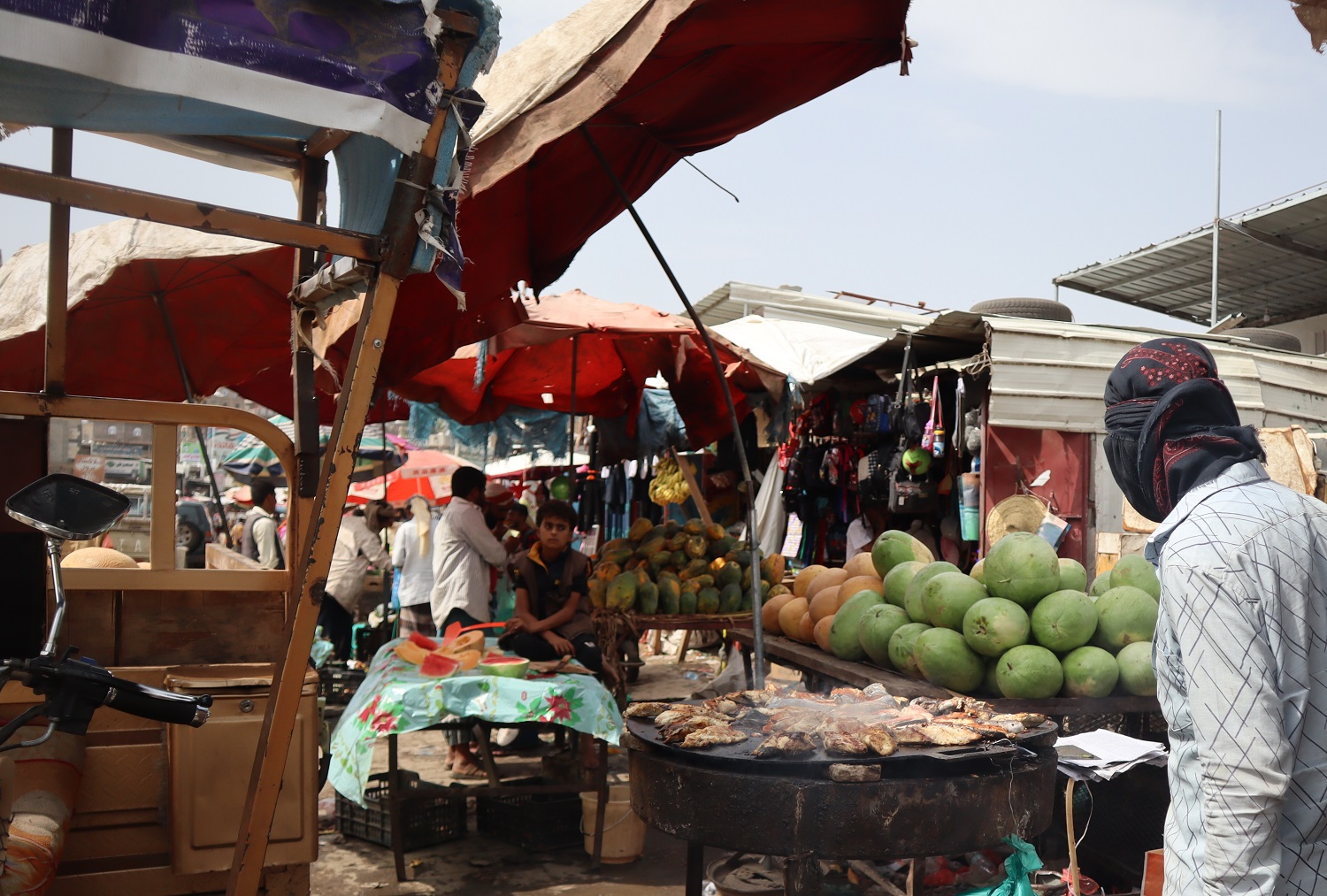
Stalls for selling vegetables in the city of Al-Dhalea (South24)
Although what happened in Al-Dhalea for decades and its being on top of the grassroot movement against the former Yemeni regime, one can’t hold these circumstances alone responsible for the current bad situation in the governorate where its governmental offices and departments close their doors hours before noon.
It seems that this state of lowest services is persistent with the continuation of the war which incurred the governorate a large part of its ramifications. This happens simultaneously with the ongoing governmental deprivation and the lack of interest by the political elites who work for the independence of South Yemen”.
Journalist at South24 Center for News and Studies
This report is part of a series of field reports during the visit of the South24 Center team to Al-Dhalea Governorate
To read the previous report:
Al-Dhalea and the Fluoride Tragedy: When Drinking Poison is the Only Choice